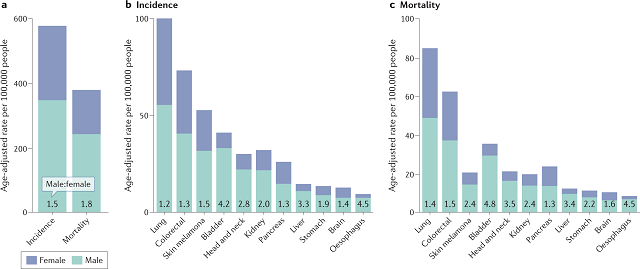Why do men face a higher risk of most types of cancer than women?
- Normal Liver Cells Found to Promote Cancer Metastasis to the Liver
- Nearly 80% Complete Remission: Breakthrough in ADC Anti-Tumor Treatment
- Vaccination Against Common Diseases May Prevent Dementia!
- New Alzheimer’s Disease (AD) Diagnosis and Staging Criteria
- Breakthrough in Alzheimer’s Disease: New Nasal Spray Halts Cognitive Decline by Targeting Toxic Protein
- Can the Tap Water at the Paris Olympics be Drunk Directly?
Why do men face a higher risk of most types of cancer than women?
- Should China be held legally responsible for the US’s $18 trillion COVID losses?
- CT Radiation Exposure Linked to Blood Cancer in Children and Adolescents
- FDA has mandated a top-level black box warning for all marketed CAR-T therapies
- Can people with high blood pressure eat peanuts?
- What is the difference between dopamine and dobutamine?
- How long can the patient live after heart stent surgery?
Why do men face a higher risk of most types of cancer than women?
Why do men face higher rates of most types of cancer than women? Biological sex differences may be the answer, new research suggests.
The incidence of most types of cancer is higher in men than in women, but the reasons for this are unknown.
The results of a recent Wiley study published online in Cancer, the American Cancer Society’s peer-reviewed journal, suggest that underlying biological sex differences may be the cause rather than behavioral differences related to smoking, diet, alcohol consumption and other factors.

Understanding the causes of gender differences in risk can provide important information for improving cancer prevention and treatment.
To investigate, Sarah S. Jackson, PhD, of the National Cancer Institute, part of the National Institutes of Health, and her colleagues assessed 171,274 men and 122,826 men aged 50-71 who participated in the NIH-AARP Diet and Health Study from 1995-2011 Differences in cancer risk among female adults at 21 anatomical cancer sites.
“Our findings show that differences in cancer incidence cannot be explained by environmental exposure alone. This suggests that there are inherent biological differences between men and women that influence cancer susceptibility.” – Dr. Sarah-S-Jackson
During this time, 17,951 new cancers developed in men and 8,742 in women.
Only thyroid cancer and gallbladder cancer are less common in men than women.
In other anatomical sites, the risk was 1.3 to 10.8 times higher in men than in women.
Men with the greatest increased risk were cancers of the esophagus (10.8-fold increased risk), larynx (3.5-fold increased risk), gastric cardia (3.5-fold increased risk), and bladder cancer (3.3-fold increased risk).
Men had an increased risk of most cancers even after adjusting for broad risk behaviors and carcinogen exposure.
In fact, differences in risk behavior and carcinogen exposure between men and women account for only a fraction of the male-predominance in most cancers (ranging from 11% in esophageal cancers to 50% in lung cancers).
The results suggest that biological differences between the sexes — such as differences in physiology, immunity, genetics and others — play an important role in cancer susceptibility in men versus women.
“Our results show that differences in cancer incidence cannot be explained by environmental exposure alone. This suggests that there are inherent biological differences between males and females that influence susceptibility to cancer.
An accompanying editorial discusses the study’s findings, noting that a multifaceted approach is needed to address gender disparities in cancer.
The authors write: “Gender should be strategically implemented as a biological variable throughout the cancer continuum, from risk prediction and cancer primary prevention, cancer screening and secondary prevention, to cancer treatment and patient management. Researching and addressing gender disparities in cancer and other diseases is an ongoing quest. Laboratory-to-point-of-care translational research that effectively translates existing research findings into clinical practice is a scalable means of enabling precision medicine , and will alleviate — and ultimately potentially eliminate, gender disparities in cancer.”
Why do men face a higher risk of most types of cancer than women?
(source:internet, reference only)
Disclaimer of medicaltrend.org
Important Note: The information provided is for informational purposes only and should not be considered as medical advice.



